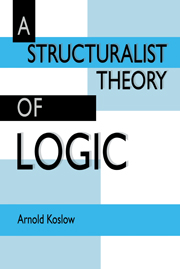Book contents
- Frontmatter
- Contents
- Preface
- Part I Background
- Part II Implication relations
- Part III The logical operators
- Part IV The modal operators
- 25 Introduction
- 26 Modality
- 27 Modals: Existence and nonextensionality
- 28 Special modals
- 29 The possibility of necessity-style modals
- 30 Modals revisited I
- 31 Quantification and modality
- 32 Modals revisited II
- 33 Knowledge, truth, and modality
- 34 The comparative strength of modals
- 35 Kripke-style systematization of the modals without possible worlds
- 36 Model functions, accessibility relations, and theories
- 37 Migrant modals
- Appendix A An implication relation for the integers in the programming language BASIC
- Appendix B Symmetric sequents as products of implication relations and their duals
- Appendix C Component-style logical operators and relevance
- Notes
- Bibliography
- Index
27 - Modals: Existence and nonextensionality
Published online by Cambridge University Press: 05 May 2010
- Frontmatter
- Contents
- Preface
- Part I Background
- Part II Implication relations
- Part III The logical operators
- Part IV The modal operators
- 25 Introduction
- 26 Modality
- 27 Modals: Existence and nonextensionality
- 28 Special modals
- 29 The possibility of necessity-style modals
- 30 Modals revisited I
- 31 Quantification and modality
- 32 Modals revisited II
- 33 Knowledge, truth, and modality
- 34 The comparative strength of modals
- 35 Kripke-style systematization of the modals without possible worlds
- 36 Model functions, accessibility relations, and theories
- 37 Migrant modals
- Appendix A An implication relation for the integers in the programming language BASIC
- Appendix B Symmetric sequents as products of implication relations and their duals
- Appendix C Component-style logical operators and relevance
- Notes
- Bibliography
- Index
Summary
Modals as functions
In our characterization of modal operators we stressed the idea that they are certain kinds of functions or mappings on implication structures, I = 〈S, ⇒〉, mapping the set S of the structure to itself and preserving the implication relation “⇒,” but not its dual.
There are several types of questions that arise naturally if we focus on the modals as operators: (1) Given any implication structure I, are there any modals on it? That is, do any modals exist? We shall show that there is a simple necessary and sufficient condition for their existence. (2) If several modal operators exist on a structure, how are they related? For example, will any two, such as φ and φ*, have to be comparable in the sense that either φ(A) ⇒ φ*(A) for all A in S or else φ*(A) ⇒ φ(A) for all A in S. We shall see that the modals on some structures need not be comparable, but that there are interesting consequences when they are. (3) What about more refined descriptions of modals as special kinds of functions? That is, what can one say about those kinds of modals φ for which φ(A) ⇒ A for all A in S? Under what conditions do they exist? Furthermore, if φ is a modal operator, is its functional product with itself, φφ, always a modal operator as well? What can be said about those special modal operators that always map theses of the structure into theses?
- Type
- Chapter
- Information
- A Structuralist Theory of Logic , pp. 254 - 264Publisher: Cambridge University PressPrint publication year: 1992



